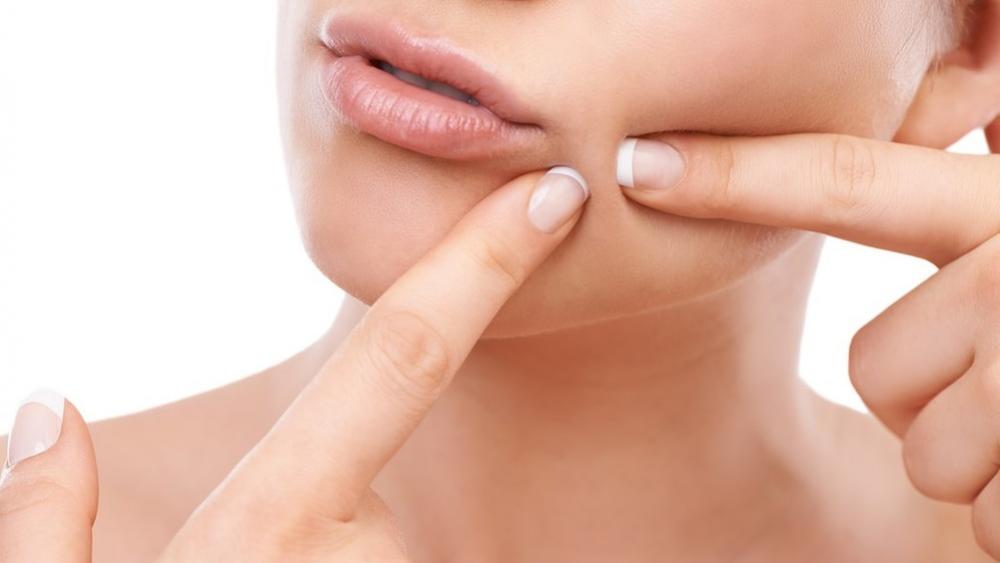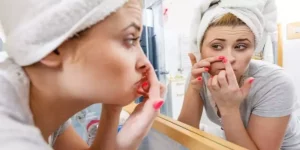Common Myths About Pimples That Are Not True

Despite how much you might want to, you shouldn’t pop that pimple. Dermatologists, estheticians, and even our mothers have cautioned us against popping pimples for a variety of reasons.
Excessive oil and grime buildup could result in a serious illness. Even though acne is unattractive, an inflammatory pimple might make you feel worse for several days. Additionally, if you squeeze a pimple, it could enlarge and become worse than before. Therefore, don’t even consider touching these pimples if you have any respect for your skin’s protective layer.
Read More About:- 7 Easy Home Remedies for Acne- Get Rid Pimples
Simply told, there are many myths and misconceptions about pimples that are inaccurate. Yes, if you don’t take care of your skin you will acquire pimples, but don’t listen to anyone who tells you to avoid specific meals because they make your skin greasy. We’ve heard the cliche “increase your water consumption” more times than we can count.
The internet is full with inaccurate information concerning acne. How can you know if the claims you’ve heard about what causes acne are true? We’re here to set the record straight, starting with the top 12 acne misconceptions.
Acne is a teenage thing. The most prevalent skin condition is acne. Acne affects people of all ages and races. Acne affects 30% of adults, including both men and women. Even though 85% of teenagers experience some sort of acne, anyone can get it.
You should wash your face more often. Acne cannot be cured by often washing your face. Try to wash your face twice a day, but more frequently than that can be harmful. Although washing your face can help to reduce bacteria, you shouldn’t go overboard.
You may safely pop your zits. That is never a wise move. Squeezing your acne might make it worse by introducing more bacteria and inducing inflammatory reactions. Additionally, it may result in acne scars that never fade.
Acne is removed by tanning booths and sunlight. The sun does not aid in the healing of acne, despite the fact that it may seem to be drying your skin. The sun can irritate and dry up your skin, which leads to increased oil production and a worsening of the condition.
Toothpaste can get rid of a zit. You should avoid using toothpaste and other common products on your skin. Even worse, the fluorides in toothpaste can make acne worse. Instead, choose a salicylic acid-containing spot treatment. In the long run, your skin will thank you.
Pores move open and shut. This is regrettably not the case. Pores cannot open and close because they lack muscles. When pores are clean of accumulated oils, they may look smaller. Steam might help with this.
Acne is a result of dirty skin. Cleanliness is not the cause of acne. Bacteria and surface oil can easily be removed by washing your face twice a day.
Acne is a result of greasy food. French fries, chocolate, and other junk food have negligible to no impact on acne. You can indulge all you want because there is no credible scientific evidence that these foods cause acne.
Try to exfoliate as much as you can. Acne cannot be eliminated by vigorous face washing. Scrubbing too vigorously can irritate your acne and aggravate it worse.
Only persons with oily skin are afflicted by acne. Acne affects people with all various types of skin. Pimples, blackheads, and whiteheads can appear on every skin type.
Acne is caused by makeup. Your skin can only become irritated by makeup if you’re using the incorrect items. Lightweight, oil-free foundations won’t be problematic until you forget to take them off at night. Before going to bed, wash your face to get rid of any oil and makeup.
Acne won’t last forever, so there’s no need to cure it. Since acne is chronic, it may persist for a very long time. It is a condition, so it is present beneath the surface of your skin. Managing your acne should always be a priority, and we can assist.
Finding a large, pus-filled pimple on your cheek the morning of a crucial meeting is one of the most annoying things that may happen. Even though it may seem to be covering 50% of your face, most people around you probably won’t even notice. Still, especially for teenagers, acne can significantly lower self-esteem.
There are a lot of misconceptions and rumours concerning pimples that are just untrue. You will get pimples if you don’t take care of your skin, but don’t listen to anyone who advises you to put down that french fry since it’ll make your skin greasy.

Here are some busted pimple myths to help you heal your skin for real.
1 Whenever they are “ready.” One can pop pimples.
Contrary to popular belief, a pimple can be squeezed as soon as it seems “ready,” indicating that it is completely filled with pus. This actually has quite a negative impact. Even if a pimple could be about to go away, many experts believe that popping it might leave scars and even promote the development of more pimples.
2 Only teenagers experience pimples.
Disproved: Acne is typically a symptom of adolescence. Perhaps you even recall getting breakouts in high school. In fact, between the ages of 11 and 30, pimples are seen in 80% of people. But many people continue to think that not everyone is affected the same manner by pimples. Some people can get pimples again in their 30s, 40s, and 50s even if they stopped getting them as teenagers.
3 Pimples appear overnight
Disproved: Acne doesn’t just emerge out of nowhere, despite the fact that you might not notice it until it is glaring you in the face. It progresses gradually, beginning with pore plugging and culminating with inflammation brought on by bacteria. A pimple takes the same amount of time to appear as it does to go away.
4 Overnight acne healing is possible.
Debunked: Regrettably, however how appealing that may sound, that is untrue. According to studies, maintaining an extended regimen or therapy for four to six weeks may start to improve your skin’s appearance. It could take some time for the skin to heal entirely. Continue your regimen if you notice any improvements because doing so may stop future breakouts.
5 Only negative habits can produce pimples.
Disproved: A number of things, such as incorrect eating habits, lack of hygiene, and improper skincare procedures, can result in pimples. A pimple can still appear no matter how regularly someone cleanses their face. Your skin’s health will only go worse if you overcleanse. Be aware that hormones have a significant impact on how they seem.
6. Only the face develops pimples.
False: Although pimples are most noticeable on the face, they can also appear on the chest, back, legs, thighs, and other regions of the body. If a pimple appears in more than one place on the body, treatment is more difficult.








